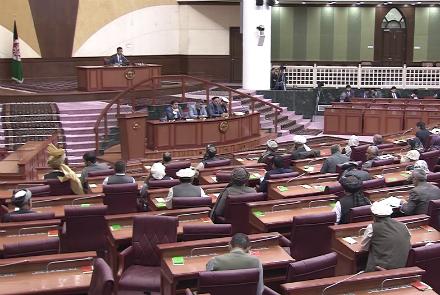Tensions remain high in Afghanistan’s Lower House of Parliament after some lawmakers in the legislative body brawled on Saturday over the election of a new speaker for the house.
Three days back, opposing lawmakers with some supporting Kamal Nasir Osuli, a candidate for the seat of parliament speaker, refused to endorse his rival candidate Mir Rahman Rahmani who was declared winner after a voting session on Saturday, May 18.
But later on, some lawmakers announced that it was decided to form a 27-member committee aimed at resolving the ongoing disputes.
Previously, a committee of 15 lawmakers was formed to solve the tension over the election of Rahmani as speaker of the Wolesi Jirga.
But why the election of a new speaker became disputed?
On Saturday, May 18, there were 247 MPs when the voting started and based on this quorum, 124 votes were needed for a winning candidate, but 244 MPs cast their votes at the end of voting. Based on the last quorum, 123 votes were needed for a winning candidate but the missing votes from the total 247 MPs turned the process controversial.
Article 71 of internal affairs principles of the parliament states that based on the provisions of the Constitution, the approval of an issue entails the majority of those present, therefore, the majority shall be determined on the basis of the ballots used.
On Wednesday May 22, the 27-member committee decided to bring the issue to the general session of the parliament to discuss the controversy over the one disputed vote, but the parliament failed to convene its session on Thursday due to high tensions between the two candidates for the seat of house speaker.
“Based on article 71 of the internal affairs principles of the parliament and in line with Article 106 of the Constitution, we are supposed to defend our decision, but what the house decides today, it depends on the MPs” said MP Ghulam Hussain Naseri.
“Even we do not have a caretaker to run the house and bring together all ideas,” said MP Irfanullah Irfan.
“Unfortunately, the issue has become an ethnic issue now and some people are manipulating it,” said MP Simin Barakzai.
Meanwhile, a number of lawmakers accused their colleagues of trying to ethnically manipulate the process of electing the new speaker.
“It appears that there are ethnic and financial issues behind the brawl,” MP Abdul Qayoum Sajjadi said.
What law says?
“The vote which is not used even the person or persons are present, but he did not use his ballot, whatever the reason is, he will not be counted as present. But the person who secured 123 votes out of 244 votes, is legally the winner in accordance with the internal affairs principles of the house,” said legal expert Waheed Farzaee.
“We do not have other option except the law. There is a need to look at the archive of the parliament and find out whether 247 members were present on that day or it was less than that figure,” said legal expert Waheed Shereen Khan Habib.

